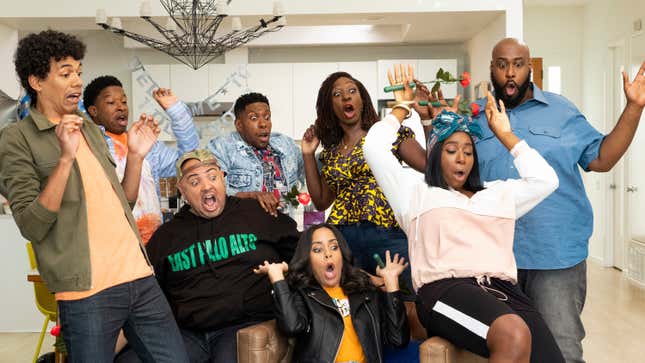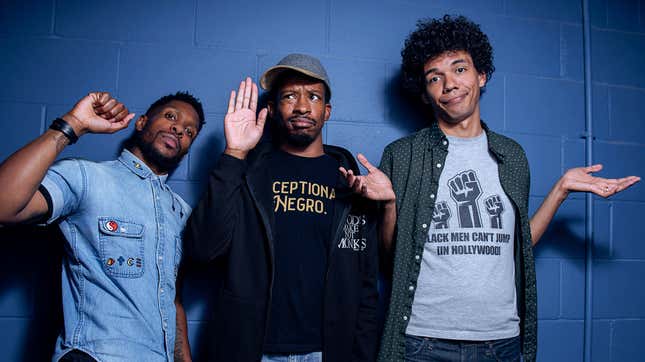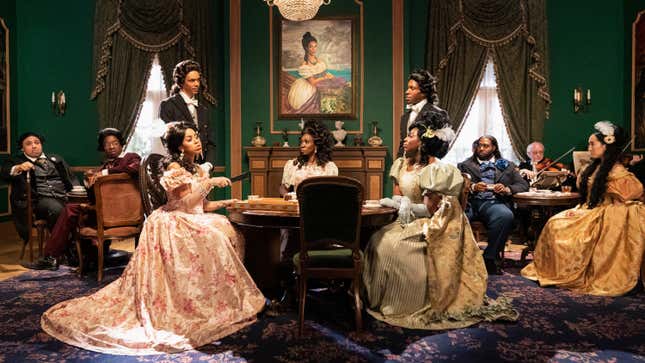
Gather in a circle, it’s time for some improv games! Actually, I lied, it’s time to read about some funny-ass black comedians to keep your eye on.
Jerah Milligan, James III and Jonathan Braylock, of the Black Men Can’t Jump podcast, are three parts of a comedy troupe named Astronomy Club, the first and only all-black house team at the Upright Citizens Brigade Theatre (UCB). Once a sketch show on Comedy Central, Astronomy Club is getting the revival treatment with a fresh start at Netflix.
In fact, Astronomy Club gained early interest when Netflix dropped a brilliant sketch following the tumultuous rehab therapy sessions for Magical Negroes.
Plus, comedic television heavyweight Kenya Barris (who has his own television universe with Black-ish, Grown-ish and Mixed-ish) is attached as a producer of the series! Jonathan refers to the troupe as the black improviser version of The Avengers and as such, we need to know their origin story. So, when Jonathan, Jerah and James joined The Root for an equally enriching and hilarious conversation about the world of improvisational comedy, that’s exactly where we started—the beginning.
The Root: What is the Astronomy Club origin story? How did Kenya get involved?
Jonathan: James III assembled us like The Avengers of black improvisers in 2014. He wanted to create an all-black improv group that could audition for a house team spot at UCB...and that’s exactly what happened! Jerah pitched that we do a black history sketch show at the theater and that became very successful and got us into Comedy Central’s Comics to Watch showcase in 2016. It was an incredibly serendipitous meeting with Anni Weisband, an Executive Producer at Khalabo [Ink Society]. She told me she was working with Kenya, and I told her that Astronomy Club was about to pitch our sketch show around town. We quickly set up a meeting and Kenya was fully on board. We couldn’t believe it.
The Root: That’s dope! Can you speak on the importance of building a community in the comedy space, especially as black comedians?
Jerah: Finding other black comedians was not only important, but necessary for me. I didn’t have any friends in the comedy world. I wasn’t a standup [comedian], which is what I think people expect from black comedy. I wanted to do improv because when I googled Tina Fey and Will Ferrell, I saw that’s what they did. When Astronomy Club was founded, I was actually in the process of quitting comedy.
Since I didn’t have any friends, I started to intern at UCB and I would purposely work at the door so I could meet the comedians. Man, when I tell you most of them would walk past me without saying “hi.” I’m talking, look you dead in the face and keep walking! It was wild. I was over the whole improv scene, so when Astronomy Club started rehearsing, it was a career saver for me. Being around other black people in comedy lets you feel seen and comfortable. Your skin color is not the joke. That happens so much when it’s all white people on stage and one black person. I hope that with our show, A Black Lady Sketch Show, Alternatino and Sherman’s Showcase, we see a mass influx of people of color in sketch and improv. I hope a black person starts their own improv school; it’s about time we give money back to our damn selves in the comedy space.

James: Comedy is lonely and depressing. You need a community to lift you up. Having a solid crew of people or even just one good person you know has your back is invaluable. When you’re onstage or on the screen and no one is laughing, that community will be there for you and push you to keep going and be better than you thought you could be. And in the alt[ernative] comedy space, there really aren’t a lot of black comedians, particularly at sketch and improv theaters like the ones we trained at. That can be alienating. I’ve been called Shanequa, labeled a criminal, and been the butt of black jokes by non-black folks in comedy. It’s infuriating. Having a clique of like-minded black folk? Priceless.
The Root: Message! So, I’ve watched a few of the sketches and I appreciate black women taking the lead in some of them. Why is it important for you all to create an atmosphere that includes and centers black women’s voices in comedy, in particular?
Jonathan: In a patriarchal world, it’s definitely important for black women’s voices to be heard, spotlighted and lifted up. But to be honest, our show features Caroline [Martin], Monique [Moses] and Keisha [Zollar] because they are super funny and the show would be worse without them. Sometimes the conversation about diversity and inclusion in Hollywood and beyond gets too caught up in why it’s important and righteous and leaves out the basic reality that diversity makes art better. It always has. We’re just in an era where we are finally acknowledging how much marginalized groups, and specifically black women, have done.
Jerah: Caroline, Mo, Keisha are funny as hell, so it would stupid to not feature them heavily. I also think it was our job as black men to make sure they were seen. There’s a history of black women riding for black men in all fields and walks of life. It’s about time we started doing our part. With the ladies of Astronomy Club and A Black Lady Sketch Show, we’re finally on the right path in comedy. Young black girls have options of which comedian they relate to most and want to be like when they grow up. That’s such a cool thing to witness. On everything, cheers to them.

James: Black women birthed the world, but the world doesn’t always show love. They should at least be able to lead a sketch. In a lot of mainstream sketch comedy when a sketch centers on black anything, it’s usually the one black sketch that pops up in a blue moon that gains traction, and it’s viewed as all-encompassing. This sketch is the Entire Black Experience. Or the Entire Black Female Experience. We have eight different black voices expressing our own truths as black people. We aren’t a group of just black men or only black women, we’re a group of eight—African American, Afro Latino, mixed, Canadian, hood black, suburban black, gay, straight. We want to tell as many of those different and unique stories as we can!
The Root: What do you see for the future of sketch comedy, particularly for black comedians?
Jerah: The comedy floodgates are open, baby and trust, we aren’t about to let them close. We walked in the building and I’m holding the side door open for everybody. We all gonna eat. Soon, it won’t be odd to see three comedy shows on the air at the same time starring black comedians...seeing a bunch of black comedians will simply be the norm. There are people right behind us that are working hard to get noticed and they will. That’s what’s so exciting...we can all cheer each other on. That would’ve never happened before because there could be only one at a time. Now with Issa [Rae], Tyler [Perry], Lena [Waithe], Donald [Glover], Ava [DuVernay], Kenya, all these dope ass black creators working to make sure that black voices are heard, it’s our time in Hollywood. We officially have a Black Hollywood.
I think the future of black sketch will be in films. We haven’t had our chance to take characters from TV to the cinema. We’ll be able to create our Wayne’s World, Blues Brothers, Superstar. There are so many things that we haven’t had a chance to parody as black people. I’m writing a film with Shawtane [Bowen] now that I hope helps start that trend. Black comedians are slowly, but surely gaining strides in Hollywood. Kevin Hart and Tiffany Hadish have done so much great work in mainstream Hollywood. Chris Rock, Eddie Murphy, Dave Chappelle, and Wanda Sykes keeps holding us down in the standup and sociopolitical comedy world that there’s so many avenues for us to go down.
Astronomy Club: The Sketch Show is now available on Netflix.
This interview has been edited for brevity and clarity.

